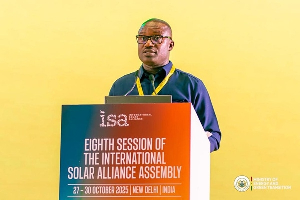The Minister of Energy, John Abu Jinapor, has announced that the government will soon terminate all inactive petroleum agreements that have failed to meet the minimum work obligations within their allocated blocks.
According to him, while the government is rolling out new measures to make Ghana’s upstream petroleum sector more attractive to investors, it will not entertain companies that hold exploration blocks without any significant activity.
The minister made this known at the opening of the 2025 Petroleum Local Content Conference and Exhibition in Takoradi on Tuesday, November 4.
He further highlighted that Ghana’s local content framework is poised to thrive through the right investor partnerships but warned that firms that have “hijacked” petroleum blocks without progress will have their agreements revoked.
The three-day conference, themed “Revitalising Ghana’s Petroleum Exploration and Production Sector: Driving Innovation and Redefined Local Content for a Competitive Energy Economy,” has brought together key industry players and investors from about 25 countries.
Participants are engaging in discussions and sharing proposals aimed at making Ghana’s oil and gas industry more competitive and beneficial to both the economy and investors.
In his remarks, the energy minister attributed the decline in Ghana’s petroleum production to past regulatory inefficiencies and incomplete licensing processes.
These challenges, he said, have led to a 25% drop in production and a 50% fall in revenue, while also discouraging investor confidence.
He, however, commended the new leadership of the Petroleum Commission for taking steps to restore investor trust and reposition the sector for growth.
Meanwhile, the Acting Chief Executive Officer of the Petroleum Commission, Emeafa Hardcastle, noted that the Commission has begun implementing strategies to make Ghana’s upstream petroleum sector more business friendly.
She explained that the Commission is redefining local content and participation policies to encourage greater collaboration and partnerships based on in-country spending rather than mere indigenous equity ownership.
Hardcastle added that Ghana’s new local content direction seeks to enhance domestic value addition across the industry, regardless of nationality, and disclosed that the country is on the verge of signing a new petroleum agreement with Shell.



